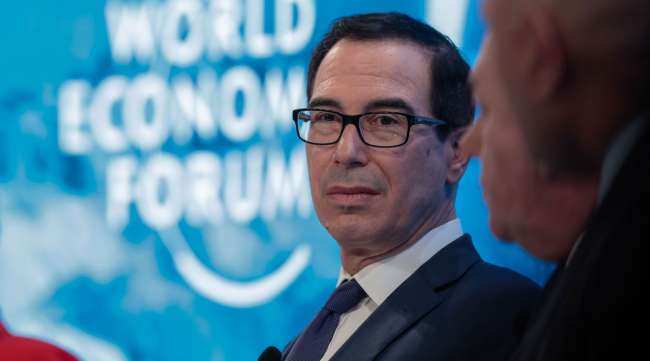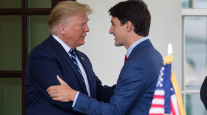Bloomberg News
Mnuchin Leverages Auto Tariff Threats Against Digital Taxes

[Stay on top of transportation news: Get TTNews in your inbox.]
Even as France indicated a willingness to postpone a disputed tax on technology companies, U.S. Treasury Secretary Steven Mnuchin dangled the prospect of retaliatory tariffs on automobile imports if the issue isn’t resolved.
French Finance Minister Bruno Le Maire will meet with Mnuchin on Jan. 22 in Davos, Switzerland, in an effort to hammer out an agreement that threatens to escalate transatlantic tensions. Le Maire said in a interview with Bloomberg that he’s hopeful for a positive outcome and that he’s “in a good mood for negotiating.”
Last year, France introduced a 3% levy on the digital revenue of companies that make their sales primarily in cyberspace, such as Facebook Inc. and Alphabet Inc.’s Google. The U.S. has threatened tariffs as high as 100% on $2.4 billion of French goods, saying the measure discriminates against American businesses.
“If people want to just arbitrarily put taxes on our digital companies, we will consider arbitrarily putting taxes on car companies,” Mnuchin said at a panel discussion at the World Economic Forum on Jan. 22. “We think the digital tax is discriminatory in nature.”
The issue, which both sides indicated was resolved Jan. 20, has nonetheless been a lightning rod for a border transatlantic trade debate at the alpine conference this week. U.S. and European officials are staking out positions ahead of talks President Donald Trump said he wants to start soon.
In a Jan. 22 press conference, Trump repeated his complaint that the European Union is worse than China in its trading relationship with the U.S.
Delay Implementation
Internet companies have long been the target of complaints that they don’t pay enough in taxes, and other countries in the EU are also are taking action. The U.K. government plans to go ahead with a tax on digital services in April, Chancellor of the Exchequer Sajid Javid said in Davos.
France denies that the levy is discriminatory — it’s also paid by European and Chinese firms — but is ready to make changes to it to appease the U.S.
Le Maire said he is prepared to delay collections of the tax due in April and November until the end of the year, so long as the U.S. refrains from imposing new tariffs.
“We have not decided to withdraw our taxation — we have just proposed not have the prepayment of April and November,” Le Maire said.
OECD Solution
Despite the French government’s willingness to compromise, they still hope to find a solution that fits within discussions at the Organization for Economic Cooperation and Development’s work on the issue, according to a French official. France pushed ahead with its tax when talks at the OECD level stalled last year.
The U.S. has said that the French tax discriminates against American technology companies, citing Section 301 of a 1974 American law that Trump has thus far reserved to justify tariffs against China. That opened the door to the U.S.’s threat to retaliate.
Among the French products targeted with duties of as much as 100% were luxury items like wine, cheese and makeup. One American wine merchant called it the biggest threat to the industry since Prohibition a century ago.
For its part, the French government had warned that the EU would retaliate if the U.S. imposed additional tariffs.
“We are working on an agreement with Steven Mnuchin, and I hope we can get a compromise in a few hours,” Le Maire said Jan. 22 in the morning. “Entering into a trade war between Europe and the U.S. would be foolish.”
Separately, Trump told the Fox Business Network that the EU planned to call an “emergency meeting” to prepare trade negotiations with the Americans.
Neither the trade spokesman of the European Commission, the EU’s executive arm in Brussels, nor a spokesperson of the Croatian government, which holds the bloc’s rotating presidency, is aware of any emergency meeting on transatlantic commercial tensions.
Want more news? Listen to today's daily briefing:




